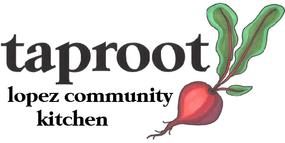Mission
It is the intention of Taproot Community Kitchen to:
- Promote local economic opportunity and entrepreneurship…create jobs
- Encourage local agriculture
- Improve island food resiliency
- Provide resources and education in food safety and production
- Offer small business support
Statement of Purpose
Taproot is a community kitchen and food storage provider. Its primary purpose is to create and sustain jobs that feature abundant fresh farm produce from San Juan County (SJC), Washington. In doing so its hopes to provide nourishment, livelihood, and food security to Lopez and the larger to San Juan County community by providing:
- Facilities for commercial food processing, in particular for adding value to locally grown fruits, vegetables, and other agricultural products.
- A shared infrastructure which permits small entrepreneurs to develop ideas at a minimal cost, and encourages cooperation, creativity, and collaboration between food producers.
- A certified commercial kitchen to intermittent users such as Farmer’s Market vendors, food truck vendors, and caterers.
- Access to commercial equipment for individuals, families, and nonprofits to efficiently process foods for their own use.
- Education on safe food handling and processing practices, facilitating small business start-ups with resources and information.
It received its designation as a tax-exempt 501 (c) (3) organization in May of 2016. It is certified by the State of Washington and San Juan County for food production. 2020 marked its first full year of operation.
Taproot’s Board Members
Randall Waugh, Board Member and Chair, has more than 15 years of experience as an entrepreneur and owner of Waugh Enterprises LLC, a food production company which is located on Lopez Island. He oversees the operations of Taproot Kitchen.
Mr. Waugh is responsible for working with the kitchen manager to maintain proper equipment operation, vendor/user compliance with operational policies, and facility security and safety. He is also Taproot’s liaison with the property owner.
Jean Perry, Board Secretary has nearly 40 years of experience in food production as well as kitchen and restaurant management.
Ms. Perry’s first commercial food venture began with Guido’s Pizza, in Seattle WA. Guido’s grew to two locations grossing more than $600,000/year and employing more than 50 people. Ms. Perry, along with three partners, was responsible for envisioning, designing, building out, and managing this lively business.
In 1996, after moving to Lopez Island, Ms. Perry started Vortex Juice Bar and Cafe, focusing on simple, local, and organic foods. Vortex is now in its 25th year of operation in Lopez Village.
Ms. Perry was also instrumental in starting the Lopez Locavores, a non-profit organization engaged in ‘cultivating a vibrant food security system through the promotion and celebration of local foods, farms, and education on Lopez Island.’ In 2016, after 8 years as Chair of the Lopez Locavore Board, Ms. Perry joined the effort to establish Taproot Kitchen
James Birkemeier, Board member, is a long-term resident of Lopez Island and a prominent member of the Lopez farming community. Jim is a farmer, gardener, and orchardist. He is a descendant of a multi-generational farming family which still operates a 300-acre orchard in Canby Oregon.
Jim is the owner of a ten-acre farm on Lopez Island, which he and his wife started from scratch by planting over 200 fruit trees and 150 blueberry bushes. He specializes in growing apples, Asian pears, blueberries, nectarines, and peaches.
Jim is a graduate of Linfield College in Oregon. Jim has been a strong supporter of Taproot as a major donor and user of its facilities since its inception, more than 6 years ago. He is dedicated to preserving local produce and to giving the local community an opportunity to participate.
“One great advantage of having a community kitchen is to have a place where summers’ bounty can be preserved for winter use. Pea pods, garlic scapes, broccoli, cauliflower can be blended together to make a base for a hearty winter soup. Vegetables and fruit can be canned or dried in a certified dehydrator. People can work together in groups, and excess produce can find a good home.A commercial kitchen makes the sale of products possible. Aside from the obvious benefit to all who wish to establish a business, the benefit of having a place where the community at large can participate in the preservation of nature’s bounty is worth serious consideration.”
~Jim Birkemeier
